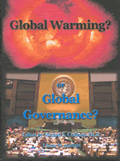UNDERSTANDING AMERICA'S
FINANCIAL CRISES
PART 2
By
Michael S. Coffman, Ph.D. and Kristie Pelletier
May 7, 2011
NewsWithViews.com
Economics for Dummies 102—International Implications and Politics
Europe’s Economy is falling like dominos. The Obama administration is following the same destructive socialist expansion of government using smoke and mirrors to convince us that it is the right way to go. It is clear that Obama is sacrificing America for political gain. We have to choose now who to follow.
For the past year we have been watching Europe’s economy unravel. It started in Greece as its debt got out of control. They were forced to make drastic cuts in their budget in order to get bailouts from the European Union (EU) and the Bank of International Settlements (BIS). Riots ensued as unions demanded their salaries and benefits not be cut.
The crisis soon spread to Ireland and then Portugal. Again, budgets had to be slashed resulting in more riots and discontent. Although England and other European nations are not in immediate trouble, they see the handwriting on the wall and are beginning to make needed cuts before their budgets have to be slashed. That has precipitated angry protests from unions which do not want to give up their cushy benefits.
The situation in America is rapidly becoming eerily similar to the dire circumstances that caused Greece, Ireland and Portugal to go belly up forced them to seek international bailouts.[1]
In
the past decade Greece, Ireland and Portugal borrowed  heavily
to fund their exorbitant socialist programs. In the fall of 2009, investors
began to lose confidence in Greece’s government’s ability
to rectify its economic problems and its ability to come good on its
debts. That culminated in April of 2010 with requests to the world for
a bailout.[2]
heavily
to fund their exorbitant socialist programs. In the fall of 2009, investors
began to lose confidence in Greece’s government’s ability
to rectify its economic problems and its ability to come good on its
debts. That culminated in April of 2010 with requests to the world for
a bailout.[2]
Ireland and Portugal were not far behind. Last week a scathing report of the causes of the collapse in Ireland hit the news. The analysis was done by Peter Nyberg, a former International Monetary Fund economist. He provided hard evidence that the Irish banking collapse was caused by bankers taking risks on a "almost unbelievable" scale, which was ignored by a complicit public, and a lack of adequate regulation. The report, commissioned by former finance minister Brian Lenihan, goes on to further blame the breakdown on “the unhindered expansion of the property bubble financed by banks using wholesale market funding.”
Nyberg concludes, "It appears now, with hindsight, to be almost unbelievable that intelligent professionals appear not have been aware of the size of the risk they were taking." There was, he says, an "inability and unwillingness to remember basic principles of banking" that providing credit is not a sale, "it is the acquisition of a risky asset.” he also forcefully blames the Irish people; "large parts of Irish society were willing to let the good times roll."[3] The similarities between Ireland and the U.S. are chilling.
Two key factors that have kept us from ending up like these decimated European nations has been our status as the largest economy in the world. The second is our dollar’s status as the world’s currency. However, the dollars reserve status may not be long for the world. There are rumblings that the dollar will soon have to compete with the Euro and the Yuen for its position as the world’s reserve currency. There are even efforts to dump all currencies for a single global currency.[4] For decades, the world has done business in dollars. The dollars’ power in this role has helped secure our economic position.[5] That is changing and as will be explained in Part 3, there are forces at work seeking to actively and intentionally undermine the dollar to end its reign.
The confidence of investors is critical to a nations’ economy as we have seen in the collapses in Europe. Credit ratings can have a significant effect on confidence. A top rating is incredibly important to obtaining the lowest interest rate possible. Confidence in the stability of the U.S. economy is critical in retaining our status as the world’s reserve currency.
There are several credit rating agencies. Standard & Poor’s, around since 1860, is one of the Big Three. Moody's Investor Service and Fitch Ratings are two more. In a release last week, S&P reported that it has downgraded the U.S. credit rating saying,
Because the U.S. has, relative to its 'AAA' peers, what we consider to be very large budget deficits and rising government indebtedness and the path to addressing these is not clear to us, we have revised our outlook on the long-term rating to negative from stable.”
The
S & P announcement goes on to say, that they, “believe
there is at least a one-in-three likelihood that we could lower our
long-term rating on the U.S. within two years,"[6]
Moody’s has also stated that they will possibly lower the U.S.
credit  rating
in the next two years if we don’t reverse the expansion of our
debt saying, “if there are not offsetting measures to reverse
the deterioration in negative fundamentals.”[7]
rating
in the next two years if we don’t reverse the expansion of our
debt saying, “if there are not offsetting measures to reverse
the deterioration in negative fundamentals.”[7]
The real danger is that the loss of an AAA rating would immediately cause the interest rates the U.S. pays to our debt holders would increase. Nobody knows how much the interest rate would increase, but we already will pay an estimated $431 billion in 2011,[8] or $5.5 trillion over the next ten years. If Interest rates went up by just 1 percent, it would increase our ten year interest payments to $6.8 trillion.[9] That’s roughly a $130 billion or 30 percent increase to the annual budget which further exacerbates the deficit and national debt woes.
The deterioration of the American economy is the result of the rapidly expanding federal government that is transforming the U.S. from a free market economy to a socialist economy similar to what is devastating Europe today. A stunning new USA Today report reveals that a record 18.3 percent of all personal income in America now comes from federal payments like Social Security, Medicare and food stamps. That’s up from 12.5 percent in 2000, most of it in the past two and a half years. Conversely, a record low of only 51 percent of all personal income comes from wages in the private sector.[10]
In other words, work for pay no longer dominates the source of income. But this also has another affect. As the total income from wages declines, so do the income tax revenues to the federal government, making it harder and harder to ever balance the budget as fewer workers pay for government programs.
This
also has real world consequences. As the U.S. economy flounders China
is set to surpass the Gross Domestic Product (GDP) of America. The International
Monetary Fund (IMF) has forecast that the Chinese economy will expand
from $11.2 trillion this year to $19 trillion in 2016, while the size
of the U.S. economy will rise from $15.2 trillion to $18.8 trillion.
That  means
that the U.S. economy will no longer be the world’s largest.
means
that the U.S. economy will no longer be the world’s largest.
According to this IMF prognosis, the candidate who wins the U.S. Presidency in the next election will be the final executive office holder in our country to preside over the world’s largest economy.[11] Imagine a world where China, a country that rigidly and sometimes violently and lethally enforces laws to control every aspect of the lives of its people, is the most powerful economy. It won’t be good.
Two Diametrically Opposed Solutions
There are two opposing camps divining a solution to these astronomical problems. One says keep spending and dumping into entitlement programs and making the government bigger and bigger. The other says cut spending, cut taxes, and cut the size of government. They can’t both be right.
Paul Ryan, Congressman from Wisconsin proposed a blueprint to begin solving the issues. The Ryan plan reduces federal spending by $6 trillion over 10 years – from the current 24 percent of GDP to the historical post-World War II average of about 20 percent.[12] Among its key provisions, it provides a flat tax to eliminate all the loopholes currently used by the rich to avoid taxes. Provides a standard deduction of $39,000 (for a family of four). Replaces the corporate income tax—currently the second highest in the industrialized world—with a business consumption tax of 8.5%.
For entitlements Ryan’s blueprint provides a “means” test for eligibility to receive benefits, creates a voucher system for Medicare, and preserves the existing Social Security program for those 55 or older.[13] Ryan never said it was a final plan, but was a starting point. Conservative critics say it doesn’t do enough. Of course the other camp says spend spend spend, no “Ryan” for us. That is the camp that gave us the health care law last year that was supposed to reduce the federal deficit. However, when all the eggs were counted and the fuzzy math removed, Obamacare will actually cost us over $2 trillion according to the CBO (Congressional Budget Office).[14]
Obama used the same fuzzy math to calculate his $4 trillion cut to the deficit in the next 12 years. When the Committee for a Responsible Federal Budget analyzed Obama’s math, they found the savings were only about $2.5 trillion.[15] Worse, the Obama plan does not address entitlement programs in a meaningful way. There is no way the deficit/debt crisis can be resolved unless entitlements are addressed.
The fact that Obama and other progressives demagogued Ryan’s plan because he did address entitlements is a clear indication that Obama did not touch entitlements solely because he is using it (once again) as a political club to bash Republicans by throwing fear into seniors and other recipients of entitlements. He as much as proved that in an April 18 Town Hall meeting in which he said, my “vision is less about reducing the deficit than it is about changing the basic social compact in America.”[16] In other words, changing the nation to full-blown socialism is more important than the looming budget crisis.
Obama’s plan to tax the rich is a red herring as well. Not only does the top 5 percent of income earners pay over 60 percent of all income taxes, the Heritage Foundation analyzed how much taxing the rich at pre-Bush rates would raise in revenue. It would raise only $700 billion in ten years out of the $9 trillion Obama’s budget adds in debt over the same period.[17] The only conceivable reason he is doing it is to wage class warfare to get the support of those on the bottom half of the income range, who only pay about 3 percent of all income taxes.
The U.S. business climate has been drastically undermined by over-regulation. Many businesses have been taxed to the point of being incapable of doing business here, or buried so deep in regulations and taxes that they have gone out of business altogether. The cost of regulations is not trivial. Annual regulatory compliance costs hit a whopping $1.75 trillion in 2008.[18] That is a “hidden tax” of over 50 percent of the entire 2010 budget! It exceeds all 2008 corporate pretax profits of $1.36 trillion. Worse, businesses had to wade through 81,405 pages of new and proposed regulations in the Federal Register in 2010, 24,914 pages of which were final rules.
How can small and medium businesses hope to keep up with this avalanche? The truth is, they can’t. As with over taxation, many businesses go out of business, which results in a “lost opportunity cost.” It is impossible to predict what this cost is, but many analysts believe it is equal to, or greater than the direct cost of $1.75 trillion. If the government was serious about reducing the deficit, reducing unneeded regulations and allow the free market to operate as it should would greatly expand business activity, profits, and therefore tax income on the profits.
The taxes on individuals have also become unbelievably burdensome with a tax on everything. [a] This country has been unique in human history. It has been a place where the circumstances of your birth need not dictate your future. It has been a place where the masses longed to come from nations all over the world to find a better life. It has been the land of the American Dream; the place where ANYONE can become ANYTHING if they are willing to work for it. The bigger the government gets and the more facets of our economy that it controls, the dimmer the American dream will become until it goes completely dark.











 Share
This Article
Share
This Article



